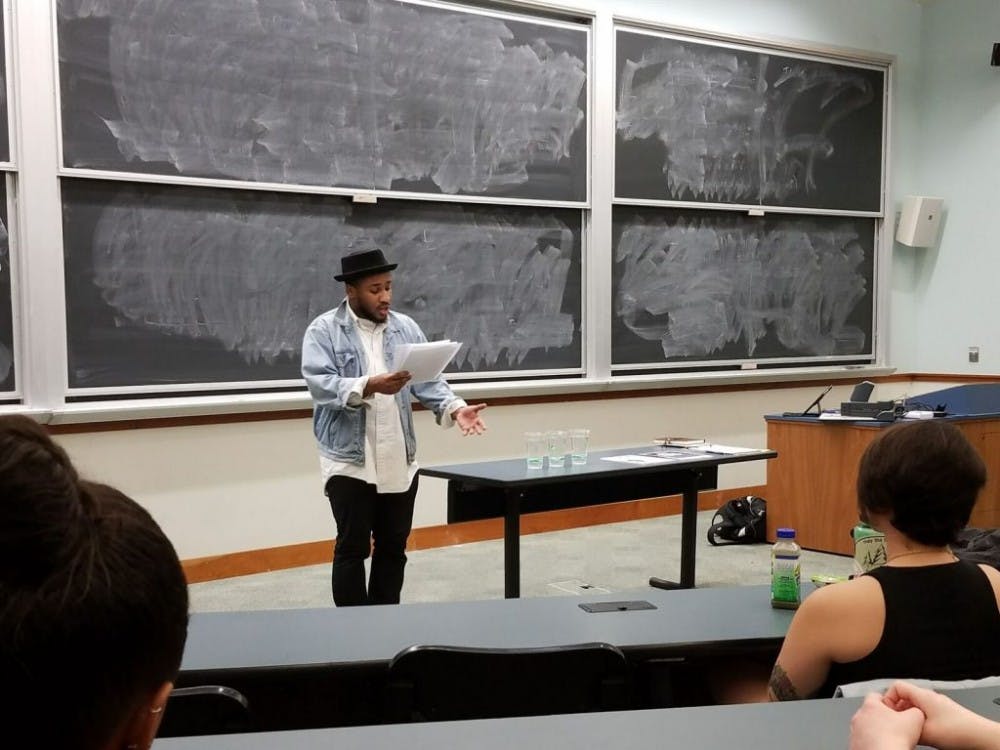Philadelphia-based poets Perry “Vision” DiVirgilio and Kavindu “Kavi” Ade gave a poetry reading focused on themes of race, religion, self image, gender and gender identity.
The reading, which was hosted by the Office of LGBTQ Life and the Office of Multicultural Affairs (OMA) in conjunction with Black History Month and the Masculinity Project, took place in Hodson Hall last Thursday.
The two speakers began by sharing their thoughts on conceptions of conventional masculinity.
“I feel like masculinity can be so toxic and binding and overbearing sometimes,” DiVirgilio said. “You can’t be free in your own skin. All these dumbass unwritten and sometimes written rules... Being under those rules is boring as f*ck.”
Ade talked about their experience as a black, queer, trans person and about how identity impacted their life. Ade’s first poem was inspired by their strained relationship with their mother.
“I am tattooed and artist and queer and vulgar and too often a reminder that she must have failed somewhere,” Ade said. “But today is my birthday. And maybe right now I don’t want this conversation that wrenches all of the air from the car.”
Ade stressed that their next poem, about growing up transgender, was particularly important in the wake of President Donald Trump’s decision to overturn laws allowing transgender students to use the public bathroom of their choice.
“I have never felt the desire to call myself a man, and I have already been a girl lost at sea when searching for womanhood,” Ade said. “I am tired of being a curiosity. How taxing the simplest routines become under the scrutiny of a hundred eyes.”
Between poems, Ade would joke with the audience and DiVirgilio, interspersing more serious topics with lighthearted banter. Ade also poked fun at DiVirgilio’s three published poetry books.
“He just read from like two different books, and I’m pretty sure he has a third one, and I just feel personally attacked when he gets up here with his books,” Ade said. “People are always like, ‘Oh do you have books?’ No, I don’t!”
DiVirgilio’s poetry focused on his personal journey of understanding and accepting himself. He talked about his decision to start writing love poems, after realizing that he rarely stepped out of his poetic comfort zone. DiVirgilio’s love poem to himself dealt with his struggle with body image.
“In a world where six-packs are the desirable attribute, it’s hard to admire yourself when you have a keg,” DiVirgilio said. “On days that I wish that you would just shrink, I will force myself to find ways to love you.”
DiVirgilio also discussed his role as a cisgendered, heterosexual male, and how he believed he needed to use his privilege to empower others by channeling it into his poetry.
“I don’t accept the term [ally] lightly,” DiVirgilio said. “I don’t think it’s something cis het men should wear as a label. It has to be a consistent journey with no ending, with no end destination... However, I do believe that when you’re an ally, you’ve got to use everything you have to help.”
Ade and DiVirgilio answered questions from the audience following the poetry reading. In response to a question about his writing process, DiVirgilio said that he focused on writing the poems that only he could write.
“I feel like while I’m blessed with height and weight, I gotta write poems kind of checking other brothers. I feel like that’s my onus at this point,” he said.
In response to a question about self-care, both Ade and DiVirgilio discussed the need for escapism.
“If I just can’t deal with it, I’m gonna book a flight somewhere,” Ade said.
Overall, Ade and DiVirgilio hoped to uplift and inspire others through their poetry. Ade explained that they often spoke at colleges with small queer communities and that their goal was to give those communities the representation they needed.
DiVirgilio said that he just wanted people to feel happy and would use whatever tools he needed to do so, such as humor and self-deprecation.
“I’m one of those educators [who] wants everybody to be better than me. I want everybody to feel better than when they came,” he said.
Programming Director for OMA Cynthia Román, who was involved in organizing the reading, said that events like this are important because they provide safe spaces for underrepresented students on campus.
“We work with lots of different kinds of students, and really the hope is that we are targeting the issues that are really pertinent in society right now,” Román said. “All of us are working with folks who are underrepresented, who need a sort of community, and so this is a platform for that to happen.”
A writer herself, Román enjoyed listening to DiVirgilio and Ade.
“I’m always looking for new ways to expand,” she said. “[I liked] what Vision was mentioning before about getting out of my comfort zone and getting myself uncomfortable and thinking outside of the box.”
Writing Seminars major Dani Pitkoff also enjoyed the reading.
“I’m on the Women’s Advisory Board, it’s with the Gender Equity office, so this was one of the events that they were helping sponsor,” Pitkoff said. “[The event] definitely reinforced the idea that activism through art can be powerful.”





